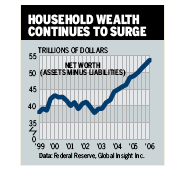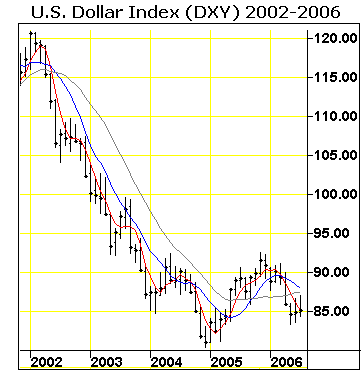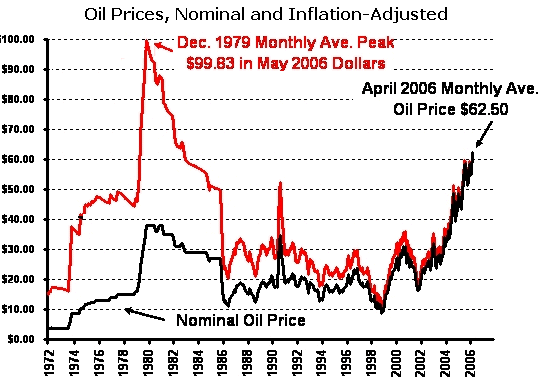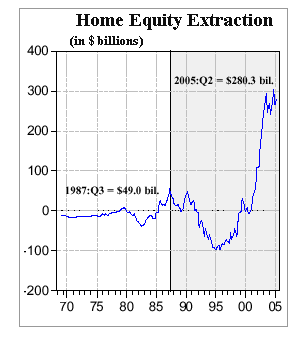

|
| weblog/wEssays archives | home | |
|
Chasing Our Tails? (August 9, 2006)  As the U.S. economy and consumer spending weakens, "the usual suspects/pundits" are
unanimous in their prediction that corporate spending will take up the slack. Nice theory,
but doesn't corporate growth depend on consumer spending, which is roughly 70% of the entire U.S.
economy? And if consumer spending is faltering as the real estate bubble house-of-cards
collapses, then exactly why would businesses ramp up their spending?
As the U.S. economy and consumer spending weakens, "the usual suspects/pundits" are
unanimous in their prediction that corporate spending will take up the slack. Nice theory,
but doesn't corporate growth depend on consumer spending, which is roughly 70% of the entire U.S.
economy? And if consumer spending is faltering as the real estate bubble house-of-cards
collapses, then exactly why would businesses ramp up their spending?
The Bull case is enshrined in this little chart: we're all richer now, much richer, so we can continue to spend, spend, spend. But there's a few things wrong with this glowingly Bullish chart: 1. The rise in wealth coincides with the rapid run-up in home values and the stock and bond markets since 2002. Now that the stock market is due for a fall, bonds are iffy and housing is falling, then what makes anyone think the wealth will continue rising?  2. Most of the stock and bond wealth is held by the top 10% of U.S. households. Hence, this
vast rise in wealth is not evenly distributed among the consuming millions; it is only
available to the top layer of wealthy families.
Wealthiest American Families Add To Their Share of U.S. Net Worth:
2. Most of the stock and bond wealth is held by the top 10% of U.S. households. Hence, this
vast rise in wealth is not evenly distributed among the consuming millions; it is only
available to the top layer of wealthy families.
Wealthiest American Families Add To Their Share of U.S. Net Worth:
The top 1% held 33.4% of the nation's net worth in 2004, up from 32.7% in 2001, but still lower than a peak of 34.6% in 1995. In 2004, the wealthiest percent owned 70% of bonds, 51% of stocks and 62.3% of business assets.Sounds like chasing our own tails is the key the future U.S. economic growth: consumers are supposed to keep spending even as interest rates and energy costs rise, as employment softens, as wages continue to fall behind inflation and as the rise in home equity which enabled the borrowing of trillions in "free money" dries up. And if they falter, then hey, businesses will pick up the slack. But don't businesses sell to consumers? Last time I looked, they did; and if your customers are spending less, why would you choose to invest heavily in new plant and equipment? The standard answer is "greater efficiency," but isn't there a law of diminishing returns as all the low-hanging fruit of productivity gains have been reaped? Why dump billions in new software and equipment in the U.S. when your domestic sales and profits will be dropping? 
That U.S. corporations have hoarded their unprecedented profits for years, restraining their investment in new plant, has been a conundrum to many; but isn't it rather obvious that corporate managers are voting with their pocketbooks for a slowdown/recession? The restrained spending suggests that the corporate leaders weren't fooled by the "prosperity" of the past five years, and that they saw no reason to build new domestic capacity when an inevitable recession loomed ahead. Forget Mideast: Profits Are the Problem: Standard & Poor's also expects earnings to continue growing at a double-digit pace in the second half of the year. If those forecasts hold, it would make for the longest stretch of double-digit earnings gains since 1950, surpassing a long string of gains in the early 1990s.Profits surge to 40-year high(marketwatch.com): U.S. corporate profits jumped 21.3 percent in 2005 to $1.35 trillion. Profits have been boosted by strong productivity gains and low wage growth, and now account for their largest share of national income in 40 years -- 11.6 percent. The share that went to wage and salary earners, however, sank to 56.9 percent in the fourth quarter -- nearly a 40-year low. "It's a big puzzle," said economist Josh Bivens of the Economic Policy Institute. "If this is a knowledge economy, how come the brains aren't being compensated?"Maybe corporate leaders saw what is obvious in these charts: a sinking dollar which will eventually squeeze consumers with higher import prices; rising energy costs reducing their discretionary spending; and a frightening reliance on massive home equity extraction to support their spending. U.S. News and World Report: Home building has accounted for about a quarter of the jobs created since the 2001 recession. In the past five years, housing has also provided about $2.5 trillion in cash for owners refinancing through home equity loans ($751 billion last year, twice the high point reached in the late 1980s).  If this is "healthy growth," then why didn't companies spend on
new expansion? Answer: because it was obviously a bogus prosperity all along, built entirely
on the housing bubble, massive expansion of low-cost credit and low energy costs. Now that
all those conditions are disappearing, so is the "prosperity" which rested on such a castle
of sand.
If this is "healthy growth," then why didn't companies spend on
new expansion? Answer: because it was obviously a bogus prosperity all along, built entirely
on the housing bubble, massive expansion of low-cost credit and low energy costs. Now that
all those conditions are disappearing, so is the "prosperity" which rested on such a castle
of sand.
But wait, say the pundits: the dropping dollar will boost exports. Maybe, and how convenient that will be for their theory of rising coporate spending. But the truth is U.S. exports are heavily weighted to just a sliver of sectors: agriculture, aviation, software, entertainment. Just as the supposed "wealth effect" is actually concentrated in just a few hands, so too will rising exports be concentrated in a few hands. And what if demand in China, India, et. al. keeps oil prices rising? Then any increase in exports will simply offset the continued rising costs of petroleum imports. Relying on business spending to compensate for a flagging consumer is a threadbare rationalization of rah-rah cheerleaders hoping to convince the public that the aging Bull market is actually a young'un with years of vigor ahead. Skepticism is in order. For more on this subject and a wide array of other topics, please visit my weblog. copyright © 2006 Charles Hugh Smith. All rights reserved in all media. I would be honored if you linked this wEssay to your site, or printed a copy for your own use. |
||
| weblog/wEssays | home |